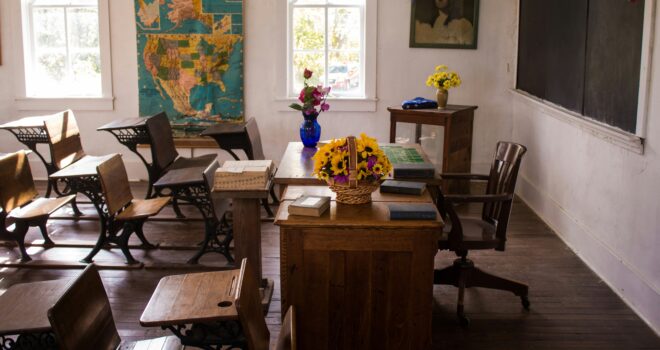With summer vacation in full swing, it’s difficult to think about school sign-ups and a return to class schedules in just a month or two. For some parents, they feel discouraged after last year’s classroom experience, the set curriculum, or even their child’s teacher. But it would be a mistaken assumption to believe that there is a perfect school for your child. In truth, no such place exists. Every school, no matter how faithful or well-designed, will fall short in some way.
For parents committed to the classical tradition—the pursuit of truth, goodness, and beauty—this realization isn’t discouraging. It’s freeing. Because the goal isn’t about seeking perfection, it’s about formation. Classical education is not merely about transmitting information; it is about cultivating the soul of the child. It invites students into the Great Conversation, forming their minds through logic, rhetoric, and grammar. Their hearts are shaped through virtue, wonder, and worship. As a parent, your task is to choose wisely the environment that will partner with you in this sacred work.
Parents Are the First Teachers
Classical education recalls what Christian tradition has always taught: parents are the first and most influential teachers in a child’s life. Long before your child reads Homer or solves a theorem, they are watching you. They learn through your tone of voice, your posture toward the world, your daily habits of discipline, forgiveness, and joy. In this sense, formation begins long before the child enters the classroom experience.
The school you choose will not replace you and your God-ordained role—it will extend it. Choosing a school is not just about academics; it is about selecting those to whom you will entrust the care and cultivation of your child’s soul.
Tip #1: Look Beyond Grades—Examine the Culture
When evaluating a classical school, look beyond curriculum guides and standardized test scores. Ask instead: What kind of people does this school produce? Is the culture one of humility, reverence, and joy? Is it steeped in a love for truth?
Classical schools often pride themselves on teaching Latin, reading the great books, and training students in logic and rhetoric. These are invaluable tools—but they are only as powerful as the moral and spiritual culture that surrounds them. If a school prizes intellect without virtue, it has missed the mark. Seek a place where wonder is nurtured and where students are not merely performing but becoming wise.
Tip #2: Choose a Place Where Leadership Means Service
In a classical context, leadership is not about status but about stewardship. The goal is to raise up students who can lead with wisdom and humility—those who know how to speak thoughtfully and also listen carefully. Schools should form students to become servant leaders who view education not as a means to personal success but as a calling to serve others.
Ask whether students are being trained in habits of attention, self-governance, and charity. How are they accomplishing this training? Do they practice hospitality? Are they encouraged to pursue truth even when it is hard? A school rooted in classical Christian principles will not merely prepare students for college or careers, but it will prepare them for virtue.
Tip #3: Stay Involved in the Formation Journey
Even in the best classical school, your role as a parent remains primary. Try not to outsource your attention. Instead, stay engaged—read what they are reading, talk about what they’re learning, and help them make connections between their education and everyday life.
Ask questions at dinner. Invite wonder. Encourage your child not just to do good work but to love what is good. When you model this love of wisdom and virtue at home, your child’s schooling becomes an extension of your family’s shared pursuit of “the good life.”
Tip #4: Trust the Process—Not the Perfection
It’s tempting to look for a school with every box checked: strong academics, beautiful campus, thriving community. But remember: classical education is not about instant outcomes. It is about forming the whole person over time. You are playing a long game.
Instead of seeking perfection, look for faithfulness. Are the teachers committed to the craft of teaching and the love of learning? Do they discipline with grace and teach with clarity? Do they point students toward Christ as the source of all truth and wisdom? Are teachers encouraged and supported by administrative leadership?
If so, you’ve found a very special educational place where real formation can happen—even if the sports program is small or the building isn’t shiny.
Choosing Influence Wisely
In the end, the school you choose will shape more than your child’s test scores—it will shape their soul. In classical education, this is a sacred task. So ask not, Is this school perfect? but rather, Is this school committed to forming my child in truth, goodness, and beauty alongside me?
Choose wisely. Then partner deeply. No school is perfect, but with the right community and faithful parents, your child will appreciate and love what is worth loving.
Photo by Jeffrey Hamilton on Unsplash

















